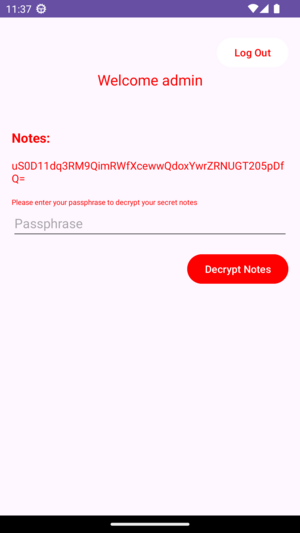In this challenge at Insomni’hack CTF, you get an Android application (apk) to analyze. Had to look at that, obviously 😉.
The challenge was solved as team work with 2 other team mates from Soudure au Beurre.
Update April 20, 2024: PKCS7 and PKCS5 are basically the same. Corrected the explanation.
Understanding the Android application
In this challenge, you get an Android application. I decompile it to find a pretty simple application with 2 classes: MainActivity and Part1.
The main activity asks for credentials to login. Those are hard-coded in the application:
1
2
3
| private boolean isValidCredentials(String s, String s1) {
return (s.equals("admin")) && (s1.equals("fbG6pXd0wm1cz"));
}
|

This launches an other activity, Part1. It also sends the password as extra data, but actually this is not used, perhaps just there to confuse the player.
1
2
3
4
5
6
| if(this.isValidCredentials(s, s1)) {
Intent intent0 = new Intent(MainActivity.this, Part1.class);
intent0.putExtra("password", s1);
MainActivity.this.startActivity(intent0);
return;
}
|
Part1 activity reads an encrypted note from a file in the assets and displays it.
1
2
3
4
| String s = Part1.getJSONData(this, "storage.json");
try {
s1 = new JSONObject(s).getString("note");
}
|
The content of storage.json is the following. It hints that AES-256 is used, which will be confirmed later.
1
2
3
4
| {
"AES-Type": "256",
"note": "uS0D11dq3RM9QimRWfXcewwQdoxYwrZRNUGT205pDfQ="
}
|
The end-user must enter a passphrase to decrypt the note. In the following, s1 is the encrypted note and s is the passphrase.
1
2
3
4
5
6
| public void onClick(View view0) {
String s = Part1.this.editTextPassphrase.getText().toString().trim();
if(!s.isEmpty()) {
try {
((TextView)Part1.this.findViewById(id.textViewFLAG2)).setText(this.decrypt(s1, s));
...
|

The decryption algorithm is based on AES-ECB + an initial Base64 decoding. Note there are several iterations of AES.
1
2
3
4
5
6
7
8
9
10
11
12
13
| private String decrypt(String s, String s1) throws Exception {
SecretKeySpec secretKeySpec0 = new SecretKeySpec(s1.getBytes(), "AES/ECB/PKCS7Padding");
byte[] arr_b = Base64.decode(s, 0);
Cipher cipher0 = Cipher.getInstance("AES/ECB/NoPadding");
cipher0.init(2, secretKeySpec0);
for(int v = 0; v < 313370; ++v) {
arr_b = cipher0.doFinal(arr_b);
}
Cipher cipher1 = Cipher.getInstance("AES/ECB/PKCS7Padding");
cipher1.init(2, secretKeySpec0);
return new String(cipher1.doFinal(arr_b), "UTF-8");
}
|
If we perform Base64 decoding on the secret note, we have 32 bytes. As hinted previously (“AES-256”), we are going to need a 256-bit key (32 bytes).
1
2
3
4
| >>> import base64
>>> note = 'uS0D11dq3RM9QimRWfXcewwQdoxYwrZRNUGT205pDfQ='
>>> len(base64.b64decode(note))
32
|
Analysis
So, we must find a 32-byte AES key which correctly decrypts the encrypted note.
We search in the app for a hidden key, or hints for the key, but there are none.
The encrypted note is likely to be the flag, thus to begin with INS{. Or, we might have an extra step of MD5 hash, because the application includes the following function - but it is never called (strange).
1
2
3
4
5
6
7
8
9
10
11
12
13
14
15
16
17
| private String generateFlag(String s) {
StringBuffer stringBuffer0;
try {
MessageDigest messageDigest0 = MessageDigest.getInstance("MD5");
messageDigest0.update(s.getBytes());
byte[] arr_b = messageDigest0.digest();
stringBuffer0 = new StringBuffer();
for(int v = 0; v < arr_b.length; ++v) {
stringBuffer0.append(String.format("%02X", ((byte)arr_b[v])));
}
}
catch(NoSuchAlgorithmException noSuchAlgorithmException0) {
noSuchAlgorithmException0.printStackTrace();
return "";
}
return "FLAG1: INS{" + stringBuffer0.toString() + "}";
}
|
Even if the decrypted node directly decrypts to the flag, knowing the first 4 characters INS{ is going to be insufficient to find the 32 bytes…
After a while, the organizers publish a hint saying “have you heard about rockyou?”. Rockyou is a famous password list, so this suggests we need to bruteforce the password.
Implementing the solution
We download rockyou password list and only keep 32-byte passwords. Actually, this is new to me. I thought that rockyou only included or obvious passwords (123456, admin…), I wouldn’t have thought it included 32-byte long passwords, but yes, there are a couple. In particular, one of them catches my eye: letsyouupdateyourfunnotesandmore because it includes the word notes.
I try it, bad luck it’s not the correct one.
So, I go on and implement a bruteforce program. I use Java to be able to re-use code from the application. There are a few things to adapt. In Java, Base64 does not come from android.util.Base64, and decoding is performed via a decoder: Base64.getDecoder().decode(s). Also, there are 2 surprises:
The Android code builds the AES key with SecretKeySpec secretKeySpec0 = new SecretKeySpec(s1.getBytes(), "AES/ECB/PKCS7Padding");. This does not work in “pure” Java, padding and block mode should not be specified in the SecretKeySpec. It’s a bit surprising this works on Android. SecretKeySpec sks = new SecretKeySpec(s1.getBytes("UTF-8"), "AES");
Java complains it does not have any PKCS7 padding provider. But PKCS7 is basically the same as PKCS5, so we can use PKCS5… actually we don’t even padding in this particular case because the encrypted note is 32-byte long….
I compile the program, and run it on rockyou32.txt. The solution is output in the blink of the eye:
1
2
3
4
| $ java DecryptNotes
Reading rockyou32.txt
passphrase=letsyouupdateyourfunNotesandmore decrypted notes=INS{H4PPY_H4CK1N6}
Solution: INS{H4PPY_H4CK1N6}
|
Opinion
I love any Android based challenge, and I was happy to see one at Insomni’hack. Moreover, this one required decompilation of the application, not some other Android trick. I love decompiling Android apps :) I was however a bit disappointed the solution involved bruteforcing. IMHO, bruteforce is for the weak 😄.
I wonder why the MD5 function was included.
Appendix: Code
1
2
3
4
5
6
7
8
9
10
11
12
13
14
15
16
17
18
19
20
21
22
23
24
25
26
27
28
29
30
31
32
33
34
35
36
37
38
39
40
41
42
43
44
45
46
47
48
49
50
51
52
53
54
55
56
57
58
59
60
61
62
63
64
65
66
67
68
69
70
71
72
73
74
| import java.io.*;
import java.security.NoSuchAlgorithmException;
import javax.crypto.Cipher;
import javax.crypto.spec.SecretKeySpec;
import java.util.Base64;
import javax.crypto.NoSuchPaddingException;
import javax.crypto.IllegalBlockSizeException;
import javax.crypto.BadPaddingException;
import java.security.InvalidKeyException;
import java.security.NoSuchAlgorithmException;
public class DecryptNotes {
public static final String ENCRYPTED_NOTE = "uS0D11dq3RM9QimRWfXcewwQdoxYwrZRNUGT205pDfQ=";
public static String decrypt(String s, String s1) throws IllegalBlockSizeException, UnsupportedEncodingException, NoSuchPaddingException, BadPaddingException, InvalidKeyException, NoSuchAlgorithmException {
SecretKeySpec sks = new SecretKeySpec(s1.getBytes("UTF-8"), "AES");
byte[] decoded_bytes = Base64.getDecoder().decode(s);
Cipher cipher0 = Cipher.getInstance("AES/ECB/NoPadding");
cipher0.init(2, sks);
for(int v = 0; v < 313370; ++v) {
decoded_bytes = cipher0.doFinal(decoded_bytes);
}
Cipher cipher1 = Cipher.getInstance("AES/ECB/PKCS5Padding");
cipher1.init(2, sks);
return new String(cipher1.doFinal(decoded_bytes), "UTF-8");
}
public static String bruteforce(String filename) {
System.out.println("Reading "+filename);
try ( BufferedReader reader = new BufferedReader(new FileReader(filename))) {
String line;
while ((line = reader.readLine()) != null) {
try {
String decrypted = DecryptNotes.decrypt(DecryptNotes.ENCRYPTED_NOTE, line);
System.out.println("passphrase="+line+" decrypted notes="+decrypted);
return decrypted;
}
catch(NoSuchPaddingException e) {
System.out.println("NoSuchPaddingException: "+e.getMessage());
}
catch (IllegalBlockSizeException e) {
}
catch (BadPaddingException e) {
}
catch (InvalidKeyException e) {
System.out.println("InvalidKeyException: "+e.getMessage()+" passphrase="+line);
e.printStackTrace();
}
catch (NoSuchAlgorithmException e) {
System.out.println("NoSuchAlgorithmException: "+e.getMessage());
e.printStackTrace();
}
catch (UnsupportedEncodingException e) {
System.out.println("UnsupportedEncodingException: "+e.getMessage());
}
}
} catch (IOException e) {
System.out.println("IOException: "+e.getMessage());
}
return null;
}
public static void main(String args[]) {
String filename;
if (args.length != 1)
filename = new String("rockyou32.txt");
else
filename = args[1];
System.out.println("Solution: "+DecryptNotes.bruteforce(filename));
}
}
|

